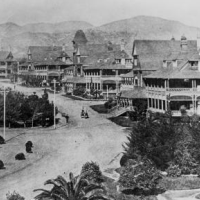Feds Settle Lawsuit over Misuse of Veterans Campus in Los Angeles
 Old Soldiers Home in Los Angeles 1892 (photo: courtesy of Carolina Barrie)
Old Soldiers Home in Los Angeles 1892 (photo: courtesy of Carolina Barrie)
The ACLU and U.S. Department of Veterans Affairs Secretary Robert McDonald both labeled as “historic” an agreement (pdf) reached Wednesday to end a four-year lawsuit and set in motion a mechanism to properly utilize a sprawling VA campus in upscale west Los Angeles.
It remains to be seen if that will get the estimated 4,200 homeless veterans off the city’s streets by the end of the year—a promise made by L.A. Mayor Eric Garcetti. But it may do something about the spectacle of officials using the 387-acre site for a wide range of activities that don’t benefit veterans while a new long-term care facility languishes half-occupied.
The agreement starts in motion development by February 13 of a general plan for dealing with issues faced by homeless veterans and finalization of a master plan for the campus by October 16. Interim plans could involve renovating buildings or using existing ones temporarily while more permanent facilities are considered.
Lawyers for the veterans and the administration will quickly ask the U.S. District Court to vacate its 2013 judgment in Valentini v. McDonald, which voided a number of leases with businesses and organizations using the campus for things that had questionable connections to vets.
The site is home to the 50-year-old Jackie Robinson Stadium (the UCLA Bruins baseball team plays there), a 20-acre parcel used by the private Brentwood School for its athletic complex, practice fields for a private soccer club, Fox studio production storage facilities, a laundry processing facility for nearby luxury hotels that missed $300,000 in lease payments, a farmers’ market and a 15-acre parcel used by community groups for events.
Last month, a two-judge panel of the U.S. Ninth Circuit Court of Appeals put a halt to any further development of the Hollywood Canteen Amphitheater until the government completed its appeal of the lower court’s ruling.
It’s doubtful that the master plan will simply adopt the original plan for the site. The land’s donors in 1887 made clear in the deed that it be used to “locate, establish, construct and permanently maintain such branch of said National Home for Disabled Volunteer Soldiers.”
And it was, at first. It had everything a small village dedicated to serving disabled veterans could need, including a trolley, a post office and a chapel. Nothing remains of the village, the last vestiges of which disappeared in the 1960s when activities for veterans at the site stagnated and declined.
The land is the largest undeveloped property on the city’s tony westside, just a stone’s throw from UCLA, and has been lusted after by developers for decades. There has also been talk of turning it into a park.
–Ken Broder
To Learn More:
VA to Set Aside Massive LA Campus for Veterans Housing (by Leo Shane III, Military Times)
U.S. Settles Suit over Misuse of West L.A. Veterans Campus (by Gale Holland, Los Angeles Times)
Dept of Veterans Affairs Reaches Historic Breakthrough Agreement (American Civil Liberties Union of Southern California)
VA Finally Speeds Up a Project, but It's Not for Veterans (by Ken Broder, AllGov California)
Principles for a Partnership and Framework for Settlement (pdf)
- Top Stories
- Controversies
- Where is the Money Going?
- California and the Nation
- Appointments and Resignations
- Unusual News
- Latest News
- California Forbids U.S. Immigration Agents from Pretending to be Police
- California Lawmakers Urged to Strip “Self-Dealing” Tax Board of Its Duties
- Big Oil’s Grip on California
- Santa Cruz Police See Homeland Security Betrayal in Use of Gang Roundup as Cover for Immigration Raid
- Oil Companies Face Deadline to Stop Polluting California Groundwater





